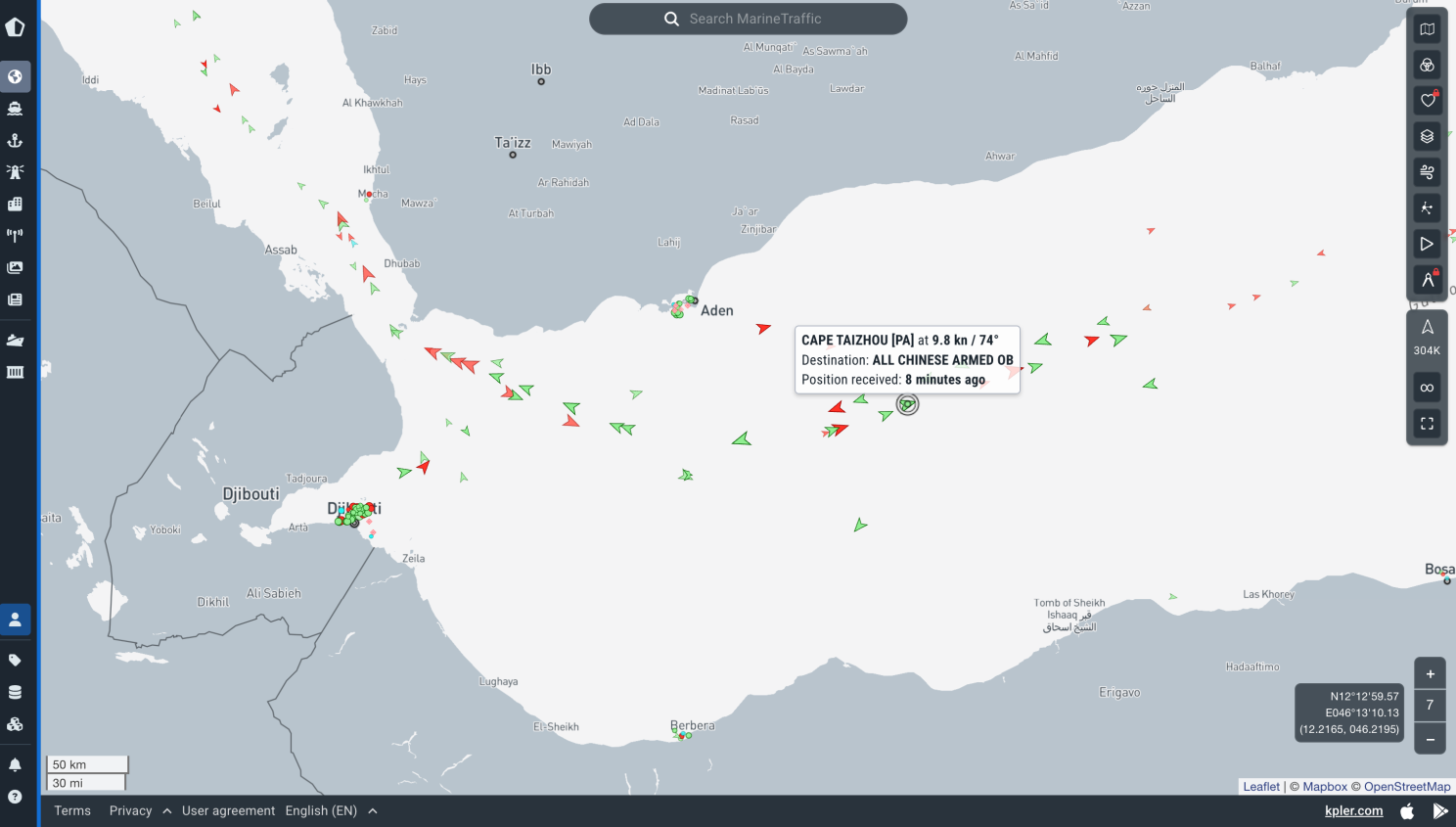China, the Houthis, and the Erosion of US Influence
A spate of recent attacks on tankers in the Red Sea is highlighting which ships are being targeted and, crucially, which are being left alone.
The relationship between China and the Houthis has been subject to increased scrutiny recently, as the Red Sea shipping attacks shed light on the strategic importance of cooperation between them. Shortly after the Houthis began their campaign of targeting commercial shipping, the group announced that China, along with Russia, would be granted safe passage through Bab Al-Mandab. Meanwhile, the Houthis received satellite imagery from a company linked to the Chinese military which assisted them in targeting ships. Now, with the Houthis recently resuming their attacks, some vessels are marking their destination as “All Chinese Crew” and “Chinese Crew and Owner”, most likely to safeguard against attacks.
Coordination between the Houthis and Beijing is perhaps most observable in online spaces, where Houthi and Chinese platforms translate and amplify each other's content–typically that which mocks or condemns US foreign and domestic policies. Both the Houthis and Beijing seek to chip away at US soft power by portraying the United States as weak, immoral, or incompetent. When, for example, the Houthis managed to down multiple US MQ-9 Reaper drones, Chinese state media was quick to share this story and praise the Houthis’ humiliation of the US military. The Houthis then shared Chinese reports as independent confirmation of what they have said all along: that US operations are doomed to fail, and that the Houthis’ divine rule over Yemen cannot be challenged.
Chinese media coverage has focused on the psychological impact of the Houthis’ battlefield successes. Their praise of the Houthis often highlights the group’s effectiveness in leveraging military operations for propaganda purposes, turning perceived victories into powerful messaging that sways public opinion.
““Chinese analyses highlight the importance of the psychological and media dimensions of the conflict, and argue that the Yemenis have succeeded in using the media as a weapon parallel to military operations. Significantly, some Chinese experts suggested that the wreckage of the US MQ-9 military drone should be transformed into a public exhibition, with the aim of attracting ‘tens of thousands of visitors. This, the [Chinese] report states, would contribute to the achievement, undermine the morale of the US military, and create the image of an ‘anti-American hero’ in the public eye. Chinese analyses believe that the Yemenis’ success in psychological and media warfare reflects a deep understanding of the importance of this dimension in modern conflicts, and an ability to effectively employ it to achieve strategic goals beyond direct military influence.” ”
Undermining the image of the United States abroad is one of the key aims of Beijing’s information operations. According to a 2024 assessment from the Office of the Director of National Intelligence, “Beijing is expanding its global covert influence posture to better support the CCP’s goals. The [People’s Republic of China] aims to sow doubts about US leadership, undermine democracy, and extend Beijing’s influence. Beijing’s information operations primarily focus on promoting pro-China narratives, refuting US- promoted narratives, and countering US and other countries’ policies that threaten Beijing’s interests … Beijing’s growing efforts to actively exploit perceived US societal divisions using its online personas move it closer to Moscow’s playbook for influence operations.”
Beyond shared narratives, China also has a clear economic incentive: ensuring the safe passage of its commercial ships through the Red Sea. There are indications of an agreement where Houthis will not target Chinese ships, with Chinese-owned or crewed vessels explicitly labelling their destination to avoid attacks. This understanding further solidifies the pragmatic relationship.
The escalating collaboration between China and the Houthis in amplifying each other's narratives is a deliberate and mutually beneficial strategy.
It grants the Houthis a crucial degree of global legitimacy, especially among non-Western governments, while simultaneously serving China's overarching goal of undermining U.S. influence and promoting its own soft power on the international stage. This dynamic, while perhaps not unexpected given the current geopolitical landscape, underscores the growing importance of information warfare in shaping global perceptions and power dynamics.



